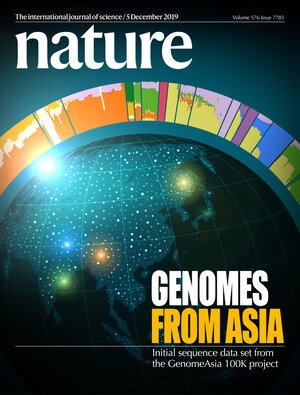
GenomeAsia 100K featured in Nature Magazine
We are a mission driven non-profit consortium collaborating to sequence and analyze 100,000 Asian individuals genomes to help accelerate Asian population specific medical advances and precision medicine.

We are a mission driven non-profit consortium collaborating to sequence and analyze 100,000 Asian individuals genomes to help accelerate Asian population specific medical advances and precision medicine.
Through an unprecedented commitment to open information, the data from GenomeAsia100K will be made available to the public

Asians-despite being >40% of the world’s population - are significantly under represented in current genomic studies and reference genome databases even though the unique genetic diversity prevalent in South and East Asia provides a valuable source of clinical insights to enable cures for all of mankind in rare and inherited diseases, as well as complex diseases such as cancer, diabetes and neurological disorders..
"Advances in sequencing, computing and mobile access mandates that we begin to study these underrepresented Asian populations"
- Dr Stephan Schuster

Advances in next generation sequencing technology now allow us to do population level sequencing. Already there is evidence that mutations present themselves differently in distinct ethnic groups. [1]
This adds to research which found that disease rates and the genes behind them vary across ethnicity. [2] GenomeAsia 100K plans to create reference genomes for Asian population as well as identify rare and frequent alleles associated with these populations. In the process, we hope to understand biology of disease and enable new therapeutic options which will have global impact.

GenomeAsia 100K has assembled a team of leading bioinformaticians and scientists in the field of population genetics. These experts will define the strategy for approaching this sizable project of sequencing 100,000 genomes.
The first stage aims to sequence 10,000 Asian individuals for ethnic stratification. This will be followed by sequencing an additional 90,000 individuals and combined with clinical and phenotype information to allow deeper analysis of diseased and healthy individuals. Our founding partners have direct access to cohorts of samples with specific disease characteristics which will be especially useful during this second stage and even allow for studies across longer time periods.
1. Manry, J., Quintana-Murci L. (2013). A Genome-Wide Perspective of Human Diversity and Its Implications in Infectious Disease, CHS Perspectives in Medicine, vol: 3 (1), pp: a012450-a012450.
2. Rotimi, C. N., & Jorde, L. B. (2010). Ancestry and Disease in the Age of Genomic Medicine. New England Journal of Medicine, 363(16), 1551–1558.